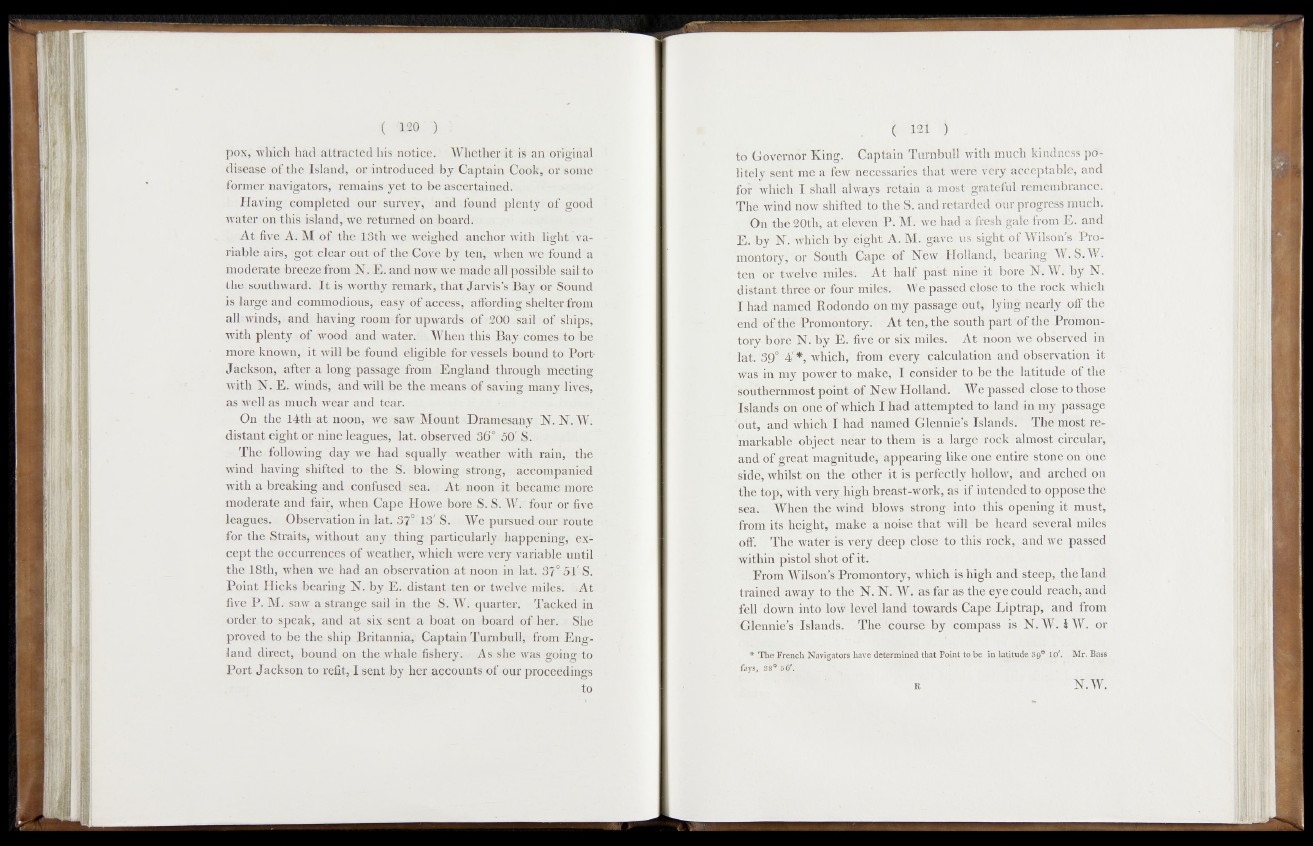
I m ) i
pox, which had attracfeedrhis‘natibeh Whetherdt isamoriginal
disease of the Island, 'or introduced'by-jGap'tain C©Pfe,^ori,<&ame
former navigators, remains yet to heascertadaed.'.;^
Having? com p le t^ oor^'shriveyv and found plenty*' of:-g®od
water-onthis island,:we rtethrried'hn Jwakhv
- ; A t five. A. M of .tbb&dtig we weighed anchor wifc^'lighste variable.
airs, ^©ticlear oufrof the Covfeby' ten',h when wejfdund a
moderate breezefromjl^iE. and now we made;:aJlippssiBle sail;td
th^saiiBthvmrd. I t is' w&1s£hy remark, that Jarvas’-saBh^fc Sound
is large and commodious», easy. oLf access, -affording, shelter-from
all? winds, and haviig: roomtfor .upwards of >2Gjlffsaii
with plenty ?of wood;, and water. . Wheadthis Bay^comes >to'.»be
mOre known, it^ will Beffbund eligiblefforwesselsBbounfd
Jacks op,: .a£ten,a long ;passage from England'.^though’'meeting
with fCffE.- winds* and will.be the meam^savingudanyilireS,1
as well as much wear and ,tear. r.
On the. 14th at noon, we saw Mount Dramesaby 1C. N.W*
distant mghfjor nine leaguesj lat. observed. 3^?s5©'.'S. . -
^ The Hollowing day wd? bad squally.sweather .witH rain, the
wind “having shifted .-to ;the S. blowing slrong, ..’acvoinpatiiod
with.,a breaking and',confesedtsea: ; At* noon it|heedm¥mi^e
moderate and fair, wMroCape Howe, bore S. S. W.t four ©bifivc
leagues. ; Observation in lat._3?°j 13'.S. We pursued-our. route
for- the »Straits»* without any thing particularly; .happening, ts#.
eept the..dc€UEFefnCes;jbf -weather, which wereiwerywkmaMe, >rrn tig
the 18th, when we;hadw|ti^bservation,at,noon in lat.:j5$° 51' S’.
Point Hicks-bearing, NdbyiE.idistanhten or twelve mailes. ^At
five, ;P. M. saw a strange sail in the -S./W. quarter. Tacked in
order,,to speak, apd at^six sent a boat on .hoard of .heriw.Shd
proved tp hq (he ship Britannia,' Captain Turnbull; from Engs-
land direct, .bound on, thewhalelfisherjlp. As^she -whs Igoing^to
Port Jackson to refit, I sent.hy her a c co u n ts^ h u r proceedings
, m
(. i2 i )
to Gdydrhór King: ’ ': (£apthin Turnbull with much kindnesl pó-
litèi%'senï me a feW'he'ev^sapfe| that'Swèrê -verfg^te^eptable, and'
for 'whiöMPshall always retain a^A l l l gratefdl remembrance*
The wihdthQw. shift^<£|fip the .S’, atari fetariiffif our prdgress much;
On^thë^|t%*p§ieven P . Mv^e-fcteka fresh fga$Hrom E. and
E . g^éfJds.,sight ©f Widsohs Prrii
montoryf-'pr*South 10apè of ISPéw .^Hólland, bearing1 W. S.‘WV
W ‘of c inilelf»o^%Kaïf p.aat'hrHp&iê^böre N*. W. by N.
d ilf » ié |w ^ S r !four 'mriêss&ïi Weqkss'edMlosè.tff fchéfrrick which
I had named Rodondo on my passage oiffe^ lying nearly pff the
% M ^ tlfe Jff^o1hdntoEy^i ^As^^a^tfirè south part'ofthè Promontory.
IdéfcmNtt' by E. ffve "or six« mdli||f *Afc^hobn ^érWbsery^ in
H I M 4'* ’ B B from Calculation and ?èbshrvatiott'^ïfe
was ififftiy „power to m ak e jlco n sid e t to be the latitude of the
sphtfaernmost,point of jMew Holland. Wepassed close to those
Istands'ön I f pW which I ha d attempted-toa-land' iM-mapassage
%ut,^an'd Which T had minted Glennie s IslanW! The mosfe^et
uïarkabttoÈjhfet. neafc tö^heihds a large ff^ck^almost circular*
and ofkgredt;'magnitude, appearing like one entire stone off one
side,whilst ort- the 'other it is perfectly hollow; and .arched ‘on
"thê'top, with vetyhigh breast-work-, as if intended to opppke<thb
When the.rffm& blow's ’ strong, into riÈfs' opening ik^naus't,
fromuts height, make a noise that will ibe heard óveral miles
‘ ofh$ The water4is very deep'close to this rock, and we passed
within pistol'shot ofdi.
. Erom Wilson’S Promontory, which is high and'steep, the land
trained away to the ^flffe/W. as far as the eye?could reach, and
fell down into lhWlevèHand towards Cape Jyiptrap, and from
Glennie's'Islands. The;'course by compass is N. W. iW . or
* The French Navigators have determined that Point to be in_la t^d e , S M r . Bass
fays]r S r '& è 1.' ÏL,
R N.W.